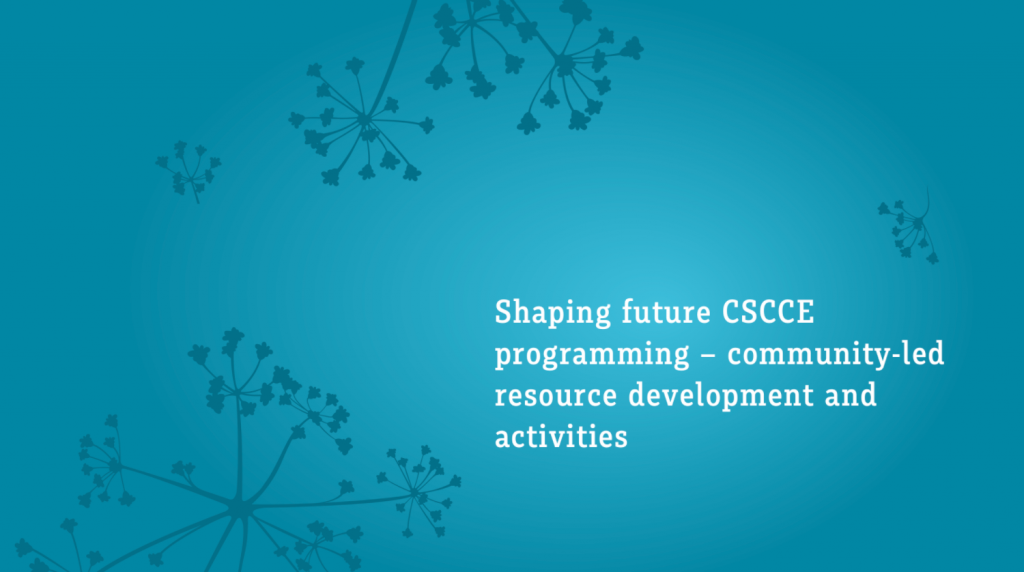On 23 November 2020, the CSCCE Data Science Special Interest Group (SIG) convened a meeting to discuss how to normalize talking about data. Julie Lowndes of Openscapes introduced the topic, providing an overview that is captured in full in the video archive below.
Category: Community Engagement
CSCCE Tools Trials 2.0
In 2020, we conducted a series of virtual tools trials, to test out platforms and apps that help communities connect and work together online. Together with members of the CSCCE community of practice, we tested eight platforms, and recapped our findings on the CSCCE blog.
This Spring, we are launching “Tools Trials 2.0.” Instead of focusing on a single platform, we’ll devote each monthly trial to discussing, and hopefully solving, a specific use case. We’ll then take what we learned and share it with the broader community.
Continue reading “CSCCE Tools Trials 2.0”DEI Special Interest Group call recap: Decolonizing STEM
CSCCE Special Interest Groups (SIGs) are member-led groups focused on specific topics of scientific community management within CSCCE’s community of practice (request to join). You can find out more about CSCCE SIGs here. The CSCCE Diversity, Equity and Inclusion SIG is convened by Cassandra van Gould, Arielle Bennett-Lovell and Kate Baker, with significant support from an organising committee and the wider community. Community members can join the Slack channel #diversity_equity_inclusion_sig to get involved.
On the 24th of November the first session of the CSCCE’s Diversity, Equity and Inclusion Special Interest Group (DEI SIG) took place. In this guest blog post, Esther Plomp and Arielle Bennett-Lovell, who co-convened the session, recap the meeting. You can also watch the three presentations in full.
During the session, we considered the concept of decolonisation and how it can be put into practice by both researchers and scientific community managers. Decolonisation is both a reflection on the academy’s relationship to lands and people occupied by colonial powers, and the process of reconsidering how this relationship is manifested in a way that restores an equitable power balance. It is not a single action, or a programme, but a long term process requiring input and engagement from everyone.
To gain a better perspective about the issue, we invited three speakers to show their perspective on decolonising science, and to offer some solutions to ensuring that the scientific research ecosystem is equitable. Below follows a summary of the talks given by Dr. Kate Baker, Dr. Thomas Mboa and Dr. Felicia Fricke.
Continue reading “DEI Special Interest Group call recap: Decolonizing STEM”December’s Community Call: It’s time for our annual potluck party!
It’s potluck time, and you’re invited! Join us for our second annual celebration and reflection, where you bring a “course,” connect with your fellow scientific community managers, and raise a glass to the highs and lows of a tumultuous year.
This year’s potluck will take place on Wednesday, 16 December at 7pm UTC / 2pm EST. Click here to join, and read on to find out what to bring!

November’s community call: Shaping the future of CSCCE programming
This month we spent our community call brainstorming ideas for CSCCE programming that meets the needs of scientific community managers who are facilitating online meetings, events, and conferences. We used Padlet boards to collect ideas, and these boards will remain open for a couple more weeks for any community members who were unable to join the call (read on for more information).

New virtual events resource alert! A DEI tip sheet and a new section of our Virtual Events Guidebook
This week we published two new free resources to help you with planning and delivering successful virtual meetings and events: a DEI tip sheet and the next part of our Virtual Events Guidebook. In this post, we tell you a little more about how these resources came to be, and ask you what you’d like to co-create with us next year.
DEI Tip Sheet: Captioning, subtitles, and transcription for virtual meetings and events
One of our recent Community Tools Trials focused on how to caption online events, making them more accessible to participants with hearing impairments, varying language fluency, or commitments that require them to multi-task. We discussed a variety of use cases, including captioning live events without incurring major time or financial costs and how to edit transcripts when an AI didn’t understand jargon or a speakers’ accent. This hour-long session, involving several knowledgeable members of our community of practice, highlighted that there was no one, easy-to-use guide available to help community managers or meeting facilitators choose between the tools or methods currently available. And so we created one!
Continue reading “New virtual events resource alert! A DEI tip sheet and a new section of our Virtual Events Guidebook”First Birthday Series: The future of CSCCE’s community of practice
For our “First Birthday Series” of blog posts, we took some time to reflect on CSCCE’s community of practice, which turned one year old on 21 October 2020. In this final post in the series, jointly authored by Communications Director, Katie Pratt and Center Director, Lou Woodley, we look back on CSCCE’s seed funding, how the Center is supported now, and our plans for a financially sustainable future.
Previous posts in this series outlined the community “by the numbers,” delved a little deeper into our programming offerings, discussed our resources and the importance of co-creating together, and summarized how our working groups and special interest groups operate and further our mission. Together, these five blog posts celebrate year one of CSCCE’s community of practice, and look ahead to the future of the Center.
Continue reading “First Birthday Series: The future of CSCCE’s community of practice”CSCCE online modular trainings: Registration is now open for our Winter courses
This Fall we launched the first in a new series of CSCCE online training modules. In this blog post, we explain the courses and when they’ll be offered again, who we hope will take them, and how they impact our other programming, including a potential CEFP2021 cohort. If you have any questions about anything in this post, please reach out to us: info@www.cscce.org.
What are CSCCE online modular trainings?
Our online modular trainings distill years of experience and expertise in building successful communities in STEM into courses that fit into your busy schedule. Each training runs for six weeks, and involves two live sessions a week (totaling 2.5 hours) along with around 90 minutes of homework to complete each week.
Continue reading “CSCCE online modular trainings: Registration is now open for our Winter courses”Announcing a new CSCCE working group – Community champions programs!
This week we’re launching a new CSCCE working group – for any STEM community managers planning or supporting community champions programs.
What are community champions programs?
As a community manager, chances are you spend a significant amount of your time operating at the “whole community” level – devising shared programming such as community calls and also creating newsletters and other reinforcing communications to keep the group informed and aligned around the various programming and activities.
While that community-level alignment is crucially important, a community moves forward its mission when members are empowered to take on emergent leadership roles – which enables the community to grow, become more sustainable, and to advance specific projects together via working groups and other smaller-group activities. In the CSCCE Community Participation Model (see image below) we refer to this mode of member engagement as the CHAMPION mode – and we’re working to develop our own champion infrastructure as well as working with other communities such as The Carpentries to develop theirs.
Continue reading “Announcing a new CSCCE working group – Community champions programs!”Ambassadors, Fellows, Champions, and More: What defines success in scientific community champions programs?
This post summarizes the report of the “Scientific Advocacy/Ambassador Programs Survey” by the 2017 Community Engagement Fellows Program (CEFP) Advocacy Ninjas project team (Melanie Binder, Heidi Laješić, Stephanie O’Donnell, Allen Pope, Gabrielle Rabinowitz, and Rosanna Volchok – with help from CSCCE Director Lou Woodley and former staff member, Rebecca Aicher) and was contributed by the authors.
Editorial note: Since the Advocacy Ninjas did their work and wrote up their report, we refined and published CSCCE’s Community Participation Model. In it, we describe a CHAMPION mode of participation, in which a community member is motivated to take on more responsibility for the success, sustainability, and/or running of the community. This might look like advocating for the community on social media, running a working group or local chapter, or taking the lead in creating and maintaining documentation to support the community. Champion programs, therefore, formalize or promote these activities, and offer recognition and training for members who participate. They empower emergent leaders, create nodes of trust within the community, and support myriad community needs and goals. Visit our new resource page for more.
Continue reading “Ambassadors, Fellows, Champions, and More: What defines success in scientific community champions programs?”